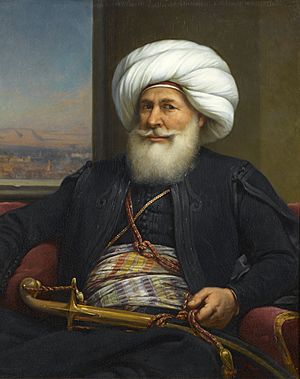Wali (administrative title) facts for kids
A Wali (pronounced Wah-lee) is an important administrative title. It means "governor" in Arabic. This title was used in many Muslim countries. It was common in the Caliphate and the Ottoman Empire.
Today, some countries still use the title Wali. These are often countries with Arab or Muslim cultural ties. The area a Wali governs is called a Wilayah. In the Ottoman Empire, it was called a Vilayet.
In the Philippines, the title Wa'lī also refers to the ceremonial leader of Bangsamoro. This is a special region in the southern Philippines.
Contents
Wali in Algeria
In Algeria, a Wali is like a "governor." They are the main administrative leader of each of the country's 58 provinces. The president chooses who becomes a Wali.
Wali in Iran
In Iran, the term is known as Vāli. It means a governor-general or a local lord. These Walis ruled important provinces.
During the Safavid rule (1501-1722), some rulers were called Vāli. This included leaders in Georgia, Ardalan, Lorestān Province, and Khuzestan Province. They were like hereditary governor-generals. These "lords of the marches" helped protect Iran's western borders.
Later, during the Qajar rule (1785-1925), the kingdom of Georgia was lost. The hereditary lords were replaced. New officials from the central government became Walis. Often, these officials were royal princes. For example, the crown prince was traditionally the Vāli of Azerbaijan.
Wali in the Ottoman Empire
In the Ottoman Empire, Vali was a common title for a governor. It was often translated as "governor-general." A Vali was in charge of a vilayet, which was a large administrative area. Many Valis were military officers, like a pasha. In some parts of the empire, the form Wali was used.
Wali in Oman
The Sultanate of Oman once ruled Mombasa, Kenya. They appointed a Wali for the city. This person was known locally as LiWali.
The term is still used today in Oman for settlements. For example, the Wilayat Madha is a settlement. It is located between Madam in Sharjah and Hatta in Dubai, in the United Arab Emirates.
In the past, many rulers of the Trucial States (now the UAE) also appointed Walis. These Walis looked after towns for the rulers.
Wali in Morocco
Since 1997, Morocco has had a regionalisation reform. Now, a Wāli is the governor of one of the twelve regions in the country.
Wali in Pakistan
In Pakistan, the rulers of the former princely state of Swat were given the title of Wali.
Wali in the Philippines
In the Philippines, the term Wa'lī is used for the ceremonial head of the Bangsamoro Autonomous Region in Muslim Mindanao. This region is on the large southern island of Mindanao.
The Wa'lī has special ceremonial duties. They act as a moral guardian for the territory. They can also call and end meetings of the parliament.
Wali in Tunisia
In Tunisia, a wāli is the "governor" of a province. They are the administrative head of each of the country's 24 provinces. The president chooses who becomes a Wali.
Wali in Turkey
In Turkey, a Vali is a provincial governor. Turkey has 81 provinces. The interior minister nominates the Vali, and the president appoints them.
A Vali makes sure state functions work well. This includes security and maintenance. They also oversee the elected provincial and municipal councils.
See also
 In Spanish: Valí para niños
In Spanish: Valí para niños
 | Janet Taylor Pickett |
 | Synthia Saint James |
 | Howardena Pindell |
 | Faith Ringgold |


